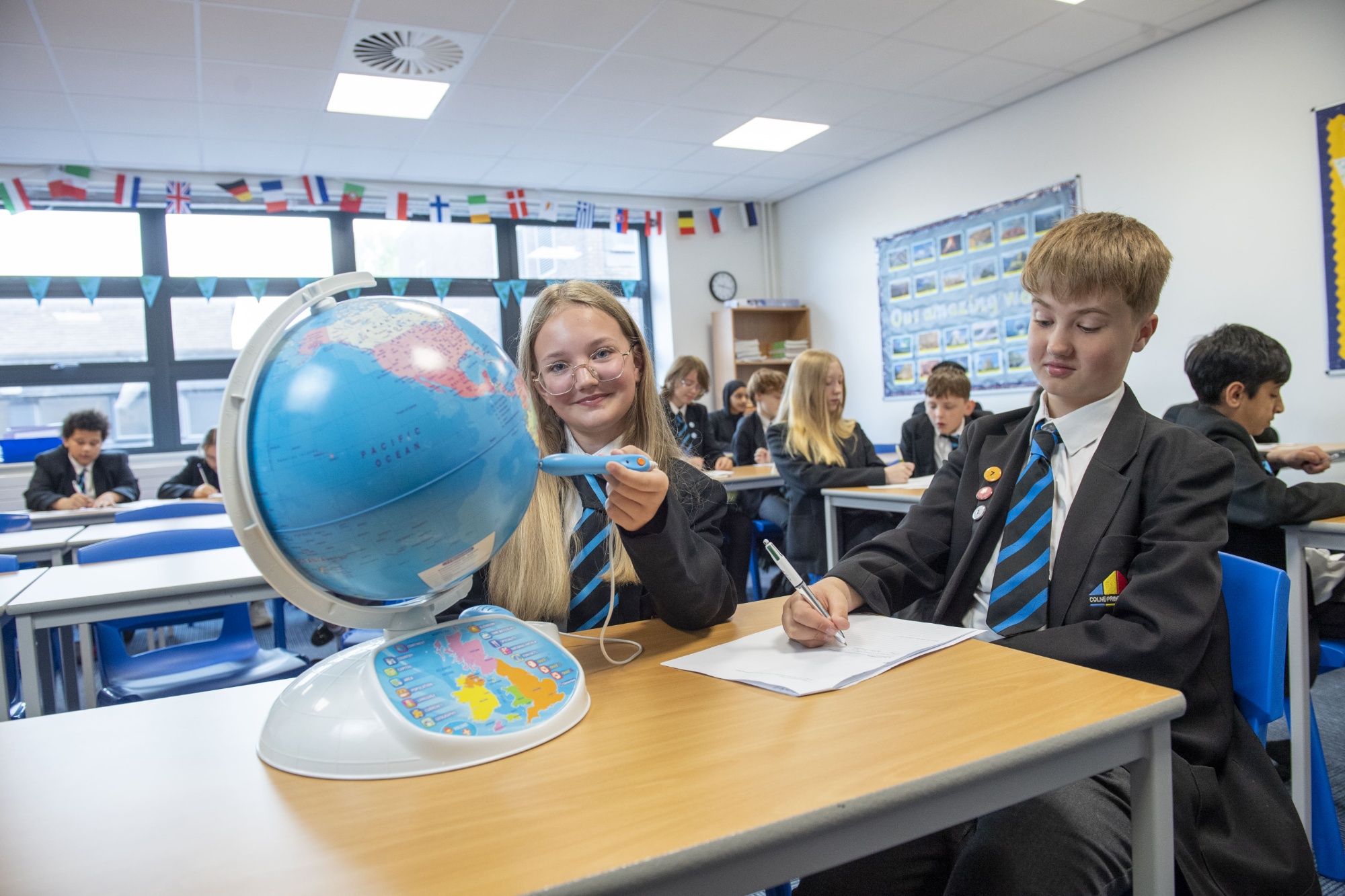Geography

Year 7
During Year 7, students gain core geographic knowledge and skills which serve them throughout the Key Stage, building the foundations for deepening understanding in the future. Students are introduced to the main geographical processes which underpin the physical world, and learn where and why there is inequality in wealth and development across the globe, exploring countries and continents which expand their understanding of the world from KS2. Students also begin to investigate the impact that people have on the planet’s environment, through a look at weather and climate on a local and more global scale.
Year 8
During Year 8, students gain core geographic knowledge and skills which serve them throughout the Key Stage, building the foundations for deepening understanding in the future. Students are introduced to the main geographical processes which underpin the physical world and learn how humans have an impact on those physical processes. Students will explore large regions of the globe and continue to understand inequality, wealth and development. Students also continue to investigate the impact that people have on the planet’s environment, through a look at global warming on a local and more global scale.
Year 8 contains a mix of physical, human and environmental geography with 6 main topical units. Each unit has been selected to provide core knowledge and skills which are developed upon through the remainder of KS3 and beyond, and is structured to learn and develop core knowledge and skills before exploring their application and use.
Geographical skills such as map reading, data/graphical interpretation and image analysis are developed from KS2 with the introduction of a range of mapping techniques. The geographical description of place and understanding of how places contrast and why is continued, along with how physical processes can be used to explain the sequential formation of landforms and the impact humans have on these landscapes.
All students will be able to access the main content of all lessons, and all students will be taught to the top with scaffolding, adaptive teaching and challenge provided where necessary.
Year 9
Students bring together prior learning and understanding to tackle and reflect upon some of the main global issues challenging humans in the modern world. Whilst exploring these issues across a range of scales, focusing on “new” global locations such The Middle East and emerging economies, students are encouraged to consider the causes of the challenges and to assess the potential solutions. Taking a global approach across themed topics, and contrasting the impacts across countries at differing levels of economic development, students can contrast the UK to other parts of the globe and consider their role and impact on the planet and how the planet and human systems can impact them.
Year 9 contains a mix of physical and human geography continuing to focus on the impact of processes on people and lives. There are 6 main topics, further split into specific areas of focus. Exemplification and locational knowledge is extended globally, selecting contrasting and relevant case studies which enables students to understand and empathise. Core knowledge and skills from KS3 are developed upon with an increasing degree of complexity as students move from conceptual to reality. Each topic unit asks students to evaluate and consider roles, causes, impacts and solutions to enable them to become informed global citizens.
Geographical skills of analysis and evaluation are now developed to demonstrate more critical thinking and reasoning skills. Source material and globally contrasting examples build awareness and empathy, along with adding more advanced geographic terminology. All students will be able to access the main content of all lessons and all students will be taught to the top with scaffolding, adaptive teaching and challenge provided where necessary.
By the end of the year students will have developed contextual knowledge of a wide range of globally significant places and be able to make links between places as well as contrast them, alongside a deep understanding of the interaction between physical and human processes and the impact people are having on the planet. The global issue themed approach will have inspired a curiosity and fascination for the world and how both the physical and human world’s function, which either encourages students to extend their Geographic studies at GCSE and beyond, or prompts students to actively consider the consequences of their actions and roles they can play in the solutions, as responsible, inquisitive and compassionate global citizens.
Year 10
AQA GCSE Geography is split into three papers. To aid students with their knowledge and understanding and synoptic skills, we interleave topics from all three papers over the two-year course. Paper 1 is ‘Living with the physical world.’ This unit is concerned with the dynamic nature of physical processes and systems, and human interaction with them in a variety of places and at a range of scales. The aims of this unit are to develop an understanding of the tectonic, geomorphological, biological and meteorological processes and features in different environments, and the need for management strategies governed by sustainability and consideration of the direct and indirect effects of human interaction with the Earth and the atmosphere. In Year 10 we study ‘physical landscape in the UK: River landscapes in the UK’ and ‘The living world: Ecosystems and tropical rainforests and cold environments.’
Paper 2 is ‘Challenges of the human environment.’ This unit is concerned with human processes, systems and outcomes and how these change both spatially and temporally. They are studied in a variety of places and at a range of scales and must include places in various states of development, such as higher income countries (HICs), lower income countries (LICs) and newly emerging economies (NEEs). The aims of this unit are to develop an understanding of the factors that produce a diverse variety of human environments; the dynamic nature of these environments that change over time and place; the need for sustainable management; and the areas of current and future challenge and opportunity for these environments. In Year 10 we study ‘urban issues and challenges’ and ‘the changing economic world’ for Paper 2.
Paper 3 is ‘Geographical applications.’ The Geographical applications unit is designed to be synoptic in that students will be required to draw together knowledge, understanding and skills from the full course of study. It is an opportunity for students to show their breadth of understanding and an evaluative appreciation of the interrelationships between different aspects of geographical study. In Year 10 we study ‘fieldwork.’ Fieldwork is an essential aspect of geography. It ensures that students are given the opportunity to consolidate and extend their geographical understanding by relating learning to real experiences of the world as well as unseen fieldwork.
Year 11
AQA GCSE Geography is split into three papers. To aid students with their knowledge and understanding we interleave topics from all three papers over the two-year course. Paper 1 is ‘Living with the physical world.’ This unit is concerned with human processes, systems and outcomes and how these change both spatially and temporally. They are studied in a variety of places and at a range of scales and must include places in various states of development, such as higher income countries (HICs), lower income countries (LICs) and newly emerging economies (NEEs). The aims of this unit are to develop an understanding of the factors that produce a diverse variety of human environments; the dynamic nature of these environments that change over time and place; the need for sustainable management; and the areas of current and future challenge and opportunity for these environments. In Year 11 we study ‘The challenges of natural hazards’ and ‘UK physical landscapes: Coastal landscapes in the UK.’
Paper 2 is ‘Challenges of the human environment.’ This unit is concerned with human processes, systems and outcomes and how these change both spatially and temporally. They are studied in a variety of places and at a range of scales and must include places in various states of development, such as higher income countries (HICs), lower income countries (LICs) and newly emerging economies (NEEs). The aims of this unit are to develop an understanding of the factors that produce a diverse variety of human environments; the dynamic nature of these environments that change over time and place; the need for sustainable management; and the areas of current and future challenge and opportunity for these environments. This unit is concerned with the dynamic nature of physical processes and systems, and human interaction with them in a variety of places and at a range of scales. In Year 11 we continue to study ‘The Changing Economic World’ and ‘The challenges of resource management and water’.
Paper 3 is ‘Geographical applications.’ The Geographical applications unit is designed to be synoptic in that students will be required to draw together knowledge, understanding and skills from the full course of study. It is an opportunity for students to show their breadth of understanding and an evaluative appreciation of the interrelationships between different aspects of geographical study. In Year 11 we study the ‘Issue evaluation’ pre-release element of the course. Students will develop a critical perspective on an issue released in late March as part of a pre-release booklet. Students will consider the points of view of the stakeholders involved, make an appraisal of the advantages and disadvantages, and evaluate the alternatives.
If you would like any more information about our Geography curriculum, please contact Mr B Adams, Head of Humanities and MFL, by emailing badams@colneprimet.co.uk, filling in the form on our contact us page or phoning the main office to arrange a call back.
